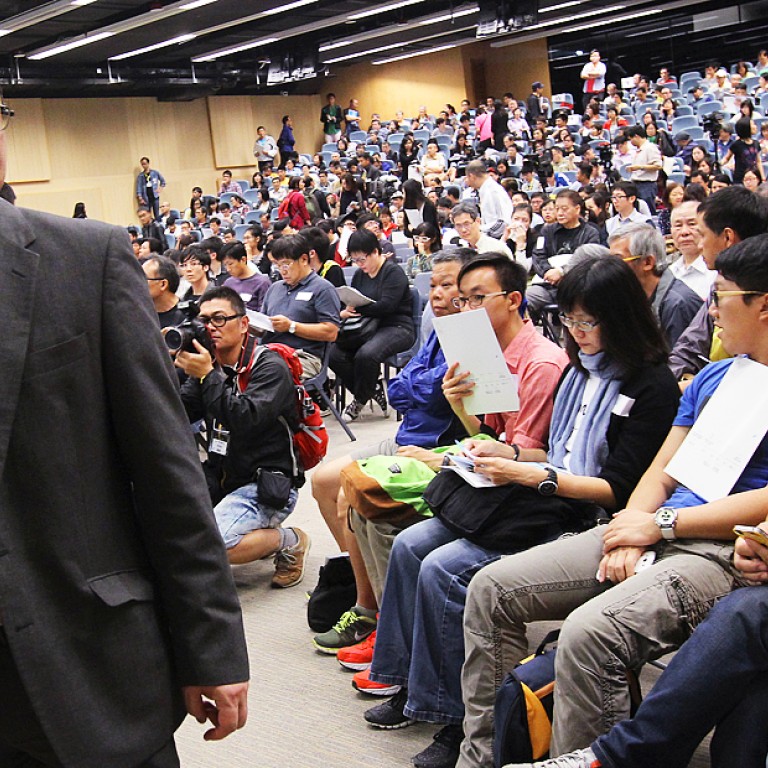
Occupy leaders should reinstate screened-out reform plans for public vote
Albert Cheng says a movement that rejects the vetting of candidates for 2017 election should not be similarly denying the people a true choice
The movement "Occupy Central with Love and Peace" is meant to exert maximum pressure on the authorities for meaningful electoral reform, but all it has achieved so far is to further divide the shaky alliance of the pan-democratic camp.
About 2,500 Occupy supporters took part in its third "deliberation day" this week. These die-hard supporters should be applauded for their persistence and noble cause.
The participants were asked to vote on 15 reform options handpicked by the Occupy organisers and considered compatible with international standards for a fair and just election. Their three most popular choices will be put to a vote by the general public on June 22.
The most preferred option will be used as a test against the official reform package, expected to be tabled in the Legislative Council for enactment by the end of the year. Should the government proposal fail to live up to their expectations, the Occupy organisers will host another referendum to determine whether to activate their much talked-about plan to paralyse the financial district.
This protracted procedure has been mocked by all sides as the antithesis of what Occupy aspired to achieve. The movement was launched primarily to prevent any attempt by the authorities to screen out certain pro-democracy activists from being nominated as candidates for the chief executive election in 2017.
Ironically, the Occupy leaders have shown the world that they, too, can be arbitrary. What Occupy did this week was let 2,500 supporters deny the public their right to choose from the complete range of reform options by screening out what they deemed undesirable.
This in effect proved, to the chagrin of other democrats, that some sort of vetting procedure is indispensable.
The respectable Occupy trio - the Reverend Chu Yiu-ming, law professor Benny Tai Yiu-ting and sociologist Chan Kin-man - have painted themselves into a corner.
Given the lack of choice, members of the public are less likely to take part in the online referendum next month. Of the 3.5 million registered voters in Hong Kong, 1.6 million cast their ballots for five seats in the district council functional constituency in the Legco poll in 2012. It will be a major embarrassment to the Occupy organisers if, say, less than 200,000, or 6 per cent of the electorate, take part in their June referendum.
The exercise is supposed to be a show of strength, but it is becoming a show of a lack of it. At this rate, the movement will lose momentum even before its leaders can decide when to "occupy".
The only way out is for them to admit they violated their own democratic principles and apologise to pan-democratic- camp sympathisers. The moderate reform options, which do not entail "public nomination" of candidates, must be reinstated for the informal referendum. These include those championed by former chief secretary Anson Chan Fang On-sang, legislator Ronny Tong Ka-wah and an alliance of 18 academics.
Unlike those three selected by Occupy supporters, these proposals provide a "middle ground" for compromise with the pro-establishment camp. As Chan pointed out, the outcome of the deliberation day excluded those who would like to head off a collision with Beijing.
This middle-of-the-road principle might well turn out to be an unacceptable solution. One way to find out is to let members of the public express their preference on June 22.
Instead of forging a consensus within their ranks, the deliberation day has widened the rifts. Chan branded the student leaders and "Long Hair" Leung Kwok-hung radicals. Leung and his group reacted by burning photos of Chan, dismissing her proposal as a "phantom of democracy".
Meanwhile, Professor Joseph Cheng Yu-shek of the Alliance for True Democracy has denounced Leung's League of Social Democrats for failing to back the so-called three-track option in the deliberation poll as promised. The scene has become such a mess it borders on the comical.
The pursuit of true democracy through mass mobilisation is not an academic exercise that one can copy from the textbooks. Its success hinges on timing and operational details. Every move must be aimed at broadening one's support base.
Opinion surveys have indicated that, instead of gaining in popularity, support for Occupy Central has been steadily declining. One young man told Voice of America, after taking part in the latest deliberations, that "Occupy Central was described as a ballistic missile, but I am afraid it is turning into a dud". Before the Occupy bomb can inflict any damage on the authorities, it has already blown the united front of the pro-democratic groups to smithereens.

